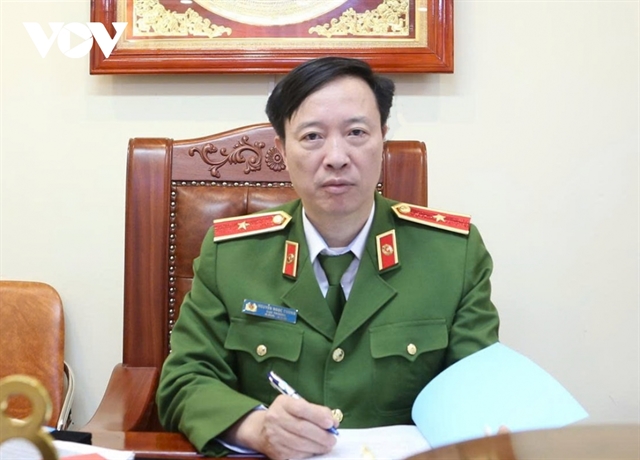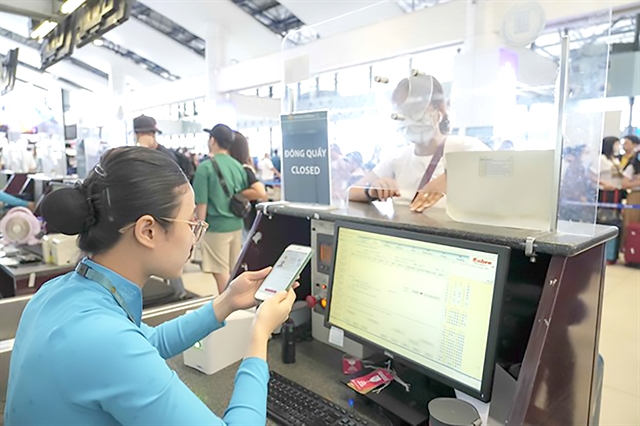 Opinion
Opinion

 |
| A passenger uses VNeID app to do check-in procedure at Nội Bài International Airport in Hà Nội. — Photo courtesy of vietnamplus.vn |
Major General Nguyễn Quốc Hùng, Director of the Police Department for the Administrative Management of Social Order (C06) under the Ministry of Public Security, spoke to Dân Trí online newspaper about the e-identification app VNeID when it was officially launched for domestic air travel from the beginning of August.
The e-identification app VNeID level 2 was officially introduced for domestic flights starting from the beginning of August. There are both positive responses and complaints regarding the extended check-in time compared to using chip-based citizen identification cards. What are your thoughts on this matter?"
Using the chip-based citizen identification card for check-in procedures might be faster, as the e-VNeID app requires a password input for access.
The use of passwords indeed enhances security. The more layers of security codes, the higher the security level. Many individuals who are not accustomed to the app or do not remember their passwords may experience delays. However, the VNeID app, like the national population database system, is in its initial stages.
In the future, we will continue to enhance the utility of this application. It may include scanning the face to confirm identity so you do not need to open the app, and the speed of recognition will also be increased.
Through media and the hotline of C06, we have received a lot of feedback regarding the insufficient convenience of the app. The reasons could be due to outdated phones that are not compatible with the app, weak network and connection systems, and people's lack of familiarity with the operations, leading to misunderstandings.
People might also struggle with access due to bandwidth overload.
To address these problems, the agency also conducts regular checks on the entire operational process of the application to assess its utility. These checks aim to identify any issues that need to be addressed in order to provide benefits to both individuals and businesses.
The eID accounts at level-2 have been introduced with the capability to integrate multiple personal paper documents, enabling citizens to perform administrative procedures solely using their mobile phones. However, the integration of other types of personal documents apart from the chip-embedded citizen identity card still encounters difficulties and numerous errors. Could you please explain the reasons behind these issues?
Not just one ministry or department alone can independently implement the project on developing and applying the population data and electronic identification and authentication to serve national digital transformation. It requires synchronisation and unity from all ministries, departments, localities, businesses and citizens.
Obstacles related to a specific ministry will be handled by that ministry. For example, matters like driver's licences and vehicle registration will be resolved by the Ministry of Transport.
C06, specifically referring to the National Population Data Centre, will have the task of receiving information and data from citizens and authenticating the correct individuals. I hope that media agencies will widely promote this information to citizens, businesses and localities.
Regarding the features of eID accounts at level-2 within the VNeID app, C06 has consistently reviewed processes, features, and functionalities to enhance their utility. Out of the 25 essential public services serving citizens and businesses, we focus on the services that people currently need the most and make them as user-friendly as possible. Currently, the focus is on simplifying procedures related to air travel, followed by enhancements in social welfare, banking, electronic payments, and more. This gradual approach aims to contribute to the development of a digital government, digital economy, and digital society.
The interconnectivity features for birth and death registration have begun to be implemented.
The national population data system brings many conveniences. How is this system secured?
Ensuring the security and safety of the national population data system is a critically important task.
The Ministry of Public Security always considers security and safety when setting up a nationwide data system. That is the legal corridor such as the enactment of the Decree on Personal Data Protection, as well as other laws like the Information Technology Law. These legal frameworks serve as a legal foundation.
In the coming time, the ministry wants the Personal Data Protection Decree to be elevated into a law so that it can best protect personal data.
Regarding the National Population Data Centre, it is protected by seven layers of security from the exterior to the inner data storage area. These layers are authenticated using personal information from citizen identification cards, biometric facial recognition, comprehensive surveillance cameras, and are controlled by C06's three officers.
The centre always arranges officers on duty around the clock and coordinates with the Network Security Bureau and High-Tech Crime Prevention Department, allowing experts in information security at home and abroad to monitor and supervise cyber safety and security.
We have also received a lot of information and media reports about the personal data of citizens being leaked. The C06 is cooperating with various departments to identify the root causes in order to implement preventive solutions.
However, initially, I can affirm that the leakage of citizens' personal data did not originate from the National Population Data Centre. — VNS




